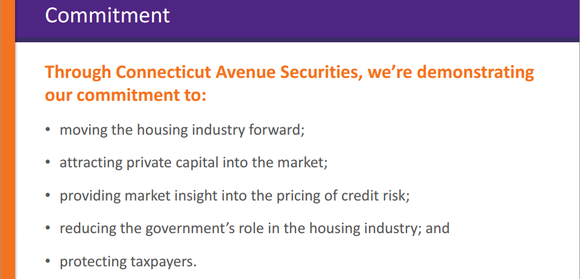Mel Watt has been at the helm of the Federal Housing Finance Agency, the conservator of Fannie Mae (FNMA +5.79%) and Freddie Mac (FMCC +3.70%), for about two weeks, and his first two moves already show where the companies may be heading.

Source: Flickr/Future Atlas.
While the appointment of Watt was met with some dissension and even required the changing of the filibuster rules for presidential appointments, Watt was sworn in on Jan. 6 to oversee the government agency. His duties will extend beyond the oversight of the two government-sponsored entities, but that role will be an important part of his obligations in his current post.
Following his appointment, Watt said, "Today's housing finance system is one of the keys to our economic recovery, and I am grateful for the opportunity to help develop a strong foundation for moving this system forward for the benefit of all Americans at this critical point in our nation's history."
But when it comes to the actual day-to-day operations of Fannie and Freddie, Watt has also announced two big changes.
Two shifts
In just his third day on the job, Watt announced the decision to delay the increase in the fee that the two entities charge to guarantee mortgages, which outgoing director Edward DeMarco said was being used to "provide better protection of and return to taxpayers, who are providing the capital support that keeps these companies operating." DeMarco also noted that the increase of the fees was to also "encourage" more private capital to begin moving into the mortgage market.

Mel Watt
When you consider that the FHFA oversees the GSEs of Fannie and Freddie as well as the 12 federal home loan banks that in total provide more than $5.5 trillion in funding in the mortgage market and to banks and other financial institutions, encouraging more private investment is undoubtedly a good thing.
About one week later, the FHFA also announced that Fannie Mae is close to the completion of its second Connecticut Avenue Securities, or C-deals, transaction, which effectively allows institutional investors to invest in the credit risk of mortgages that Fannie Mae retains on its books. This move essentially helps manage and transfer the risk posed to Fannie Mae by bringing in private investment.
Of the new transaction, Watt said, "This and other risk-sharing transactions undertaken by Fannie Mae and Freddie Mac provide valuable insight as to how to restore private sector participation in housing finance and reduce losses for taxpayers."
Why they matter
Notably absent from all of Watt's remarks in his first two weeks on the job is any language or consideration about what these moves may mean to the investors in the publicly traded preferred and common shares of Fannie Mae and Freddie Mac. In fact, he cites the benefits the moves bring to the broader American public, taxpayers, and other private investors.
In the investor presentation on the C-deals transaction, Fannie Mae notes that it has five commitments, none of which relate to its investors:

Source: "Fannie Mae's Approach to Single-Family Credit Risk Management."
It is vital to remember that Fannie Mae noted in its most recent annual report, "Because we are in conservatorship, we are no longer managed with a strategy to maximize shareholder returns," and "every dollar of earnings that Fannie Mae and Freddie Mac generate will be used to benefit taxpayers for their investment in those firms."
While it has only been two weeks, Watt is showing that the two entities are not suddenly going to be working for the benefit of shareholders, and anyone with an investment in the company should always keep that in mind.
